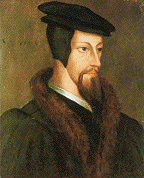July 10: Religious Bigotry in Geneva
John Calvin (1509)
It was on this date, July 10, 1509, that Jean Chauvin, whose name was Latinized and then Anglicized to John Calvin, was born at Noyon in Picardy, France, the son of a lawyer in the French middle class. He also studied law and was not a conspicuously orthodox Catholic. Unlike the profane peasant Martin Luther, 26 years his senior and with whom Calvin never met, Calvin was genteel and scholarly and was never ordained in the Catholic Church.
In Paris, in 1532, Calvin fell in with Lutheran protesters against the Mass and barely escaped arrest and execution by burning. Three years later found him lecturing the French king (by letter) on Protestant theology and urging toleration. Persuaded to come to Geneva to preach, it was there that Calvin came into his own.
He drew up his five points – total depravity, unconditional election, limited atonement, irresistible grace, and the perseverance of the saints – and to this doctrine he compelled all Genevans to swear belief. Just to show that he wasn't joking, he banished a man name Caroli who dared to doubt. His theocracy also dictated, on pain of excommunication, how Genevans dressed and what they ate, employing spies to detect those who skipped church. In 1538, tired of his tyranny, Calvin was exiled.
But just three years later, Geneva persuaded Calvin to return, which he reluctantly did in 1541 (13 September). His power now nearly absolute, he wielded it with godly gusto. The Council declared that Calvin's Institutes were a "holy doctrine which no man might speak against." Jacques Gouet did so and was imprisoned for impiety in 1547; after severe torture, he was beheaded. Within five years, Calvin passed 58 death sentences and exiled 76.
For the heresy of doubting the Trinity, Miguel Served y Reves was arrested and tried by the Catholic Church in Vienne. Michael Servetus (as he is now known) had actually debated Calvin in 1534 and somehow got the idea that Calvin stood for religious toleration in Geneva. But that was the old Calvin, the one without the power of a state to bolster his bigotry. Little did Servetus know that it was Calvin who had denounced him to the authorities in Vienne. Indeed, Calvin was miffed at Servetus's criticism of his Institutes and vowed, "If he comes here and I have any authority, I will never let him leave the place alive."
Friends helped Servetus escape the frying pan of Vienne only to enter the fire of Geneva in 1553. He was arrested and tried for heresy, but the verdict had been pronounced before Servetus ever entered Geneva. He was burned at the stake on October 27 with Calvin's complete approval. When Sebastian Castellio (1515-1563) wrote, "Let us who are Christians not condemn one another, but, if we are wiser than they are, let us also be better and more merciful" in his pamphlet, "Should heretics be persecuted?," Calvin merely banished him from his comfortable commune – a luckier break.
Exile and death, rather than persuasion by example, were the chief tools Calvin used for the enforcement of what would later be called Presbyterianism. As Robert Ingersoll described him, with only slight exaggeration, "Calvin was ... a strange compound of revengeful morality, malicious forgiveness, ferocious charity, egotistic humility, and a kind of hellish justice. In other words, he was as nearly like the God of the Old Testament as his health permitted" ("Heretics and Heresies"). Calvin died in the year William Shakespeare was born, 1564, one of the more equitable trades in history!
Originally published July 2003 by Ronald Bruce Meyer.


